新概念英语二册超详教案讲义笔记Lesson 67 Volcanoes 火山
文档属性
| 名称 | 新概念英语二册超详教案讲义笔记Lesson 67 Volcanoes 火山 | 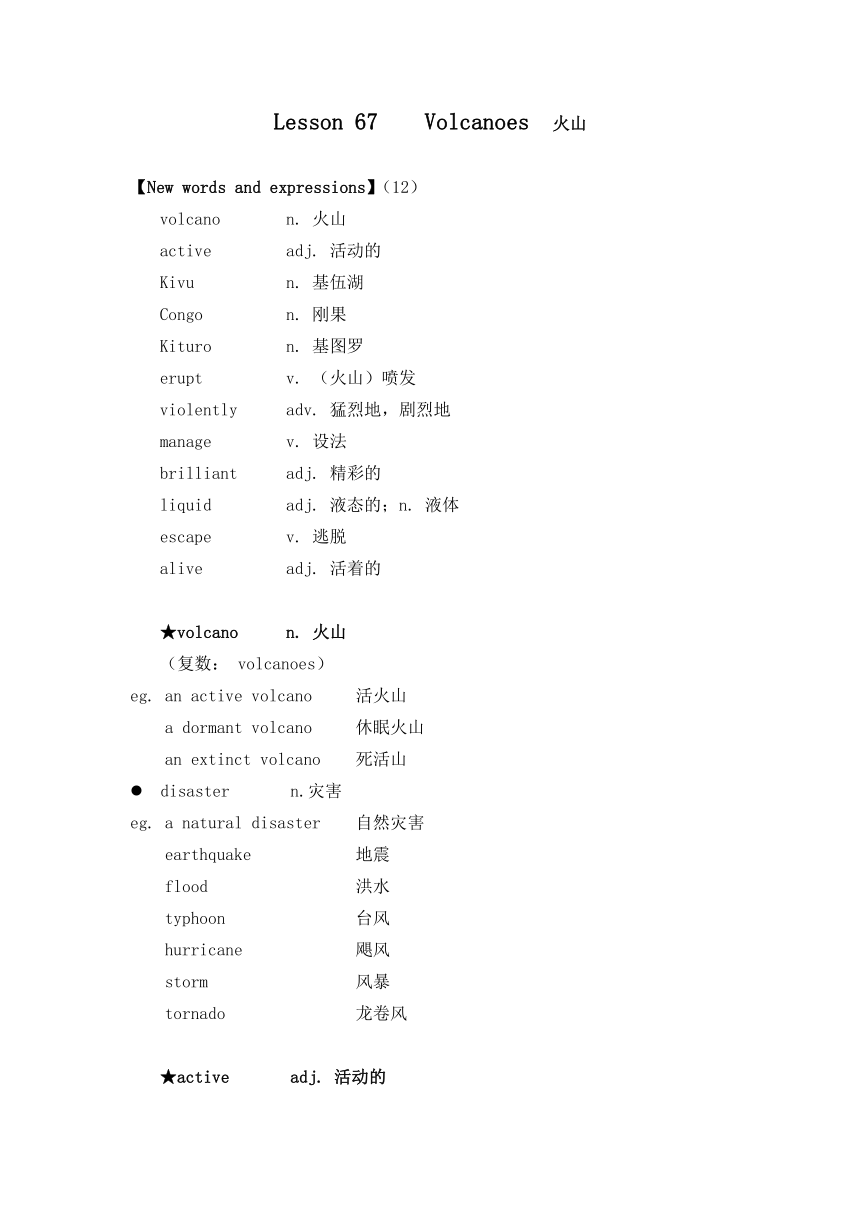 | |
| 格式 | docx | ||
| 文件大小 | 37.4KB | ||
| 资源类型 | 教案 | ||
| 版本资源 | 新概念英语 | ||
| 科目 | 英语 | ||
| 更新时间 | 2023-09-26 09:12:07 | ||
图片预览

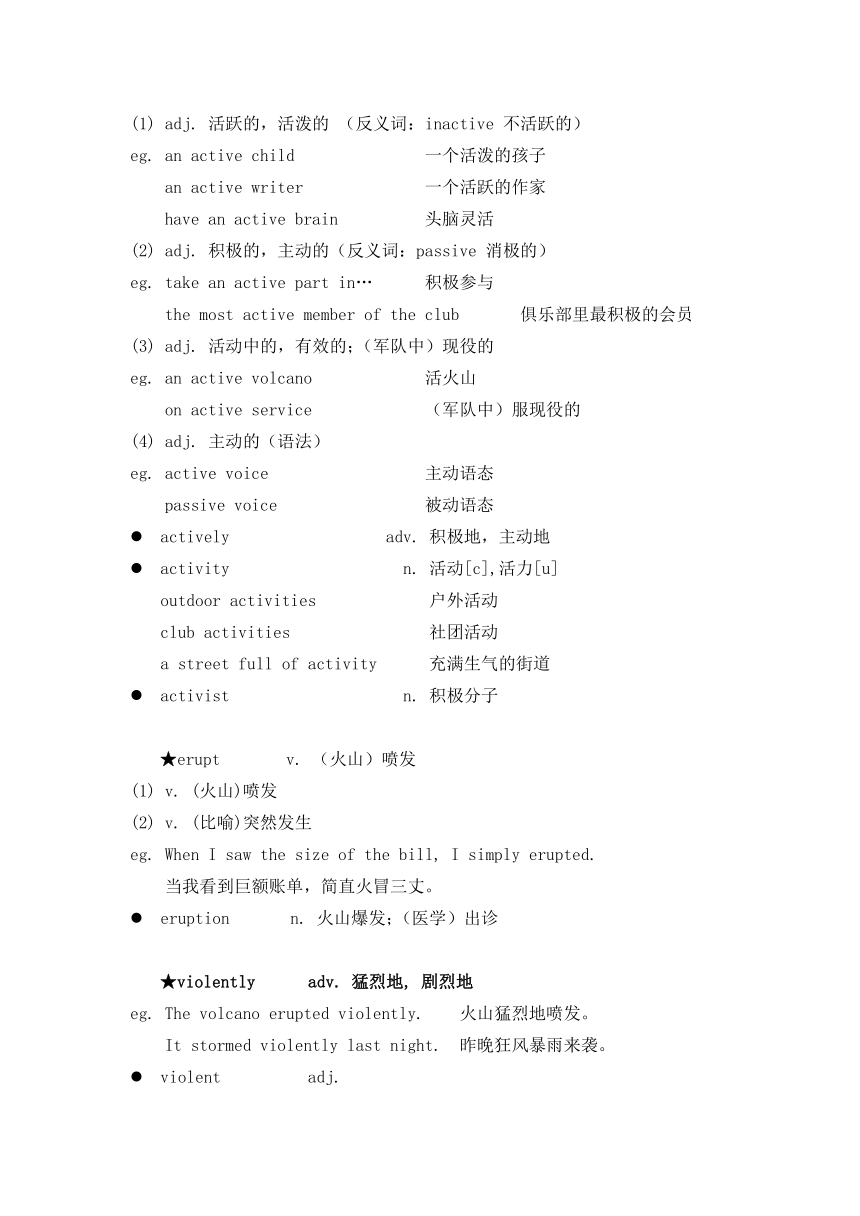
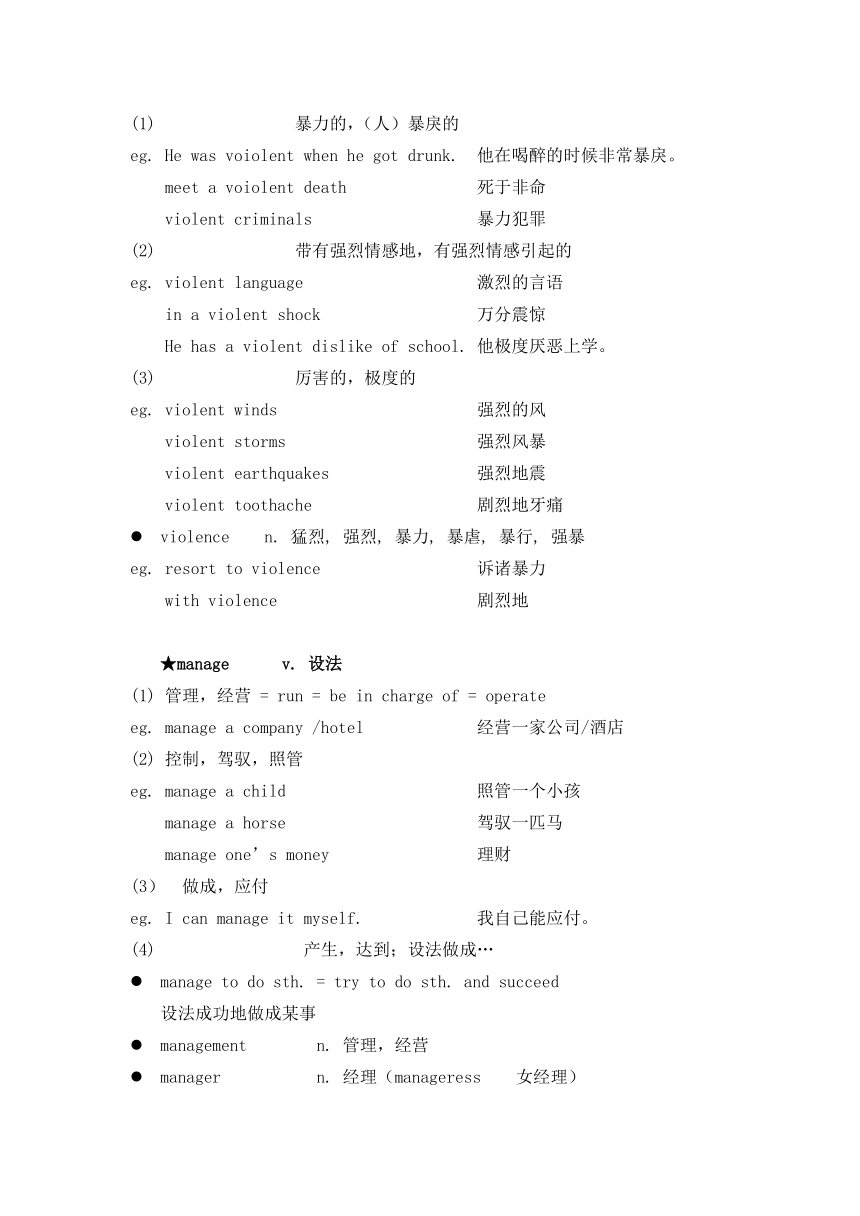
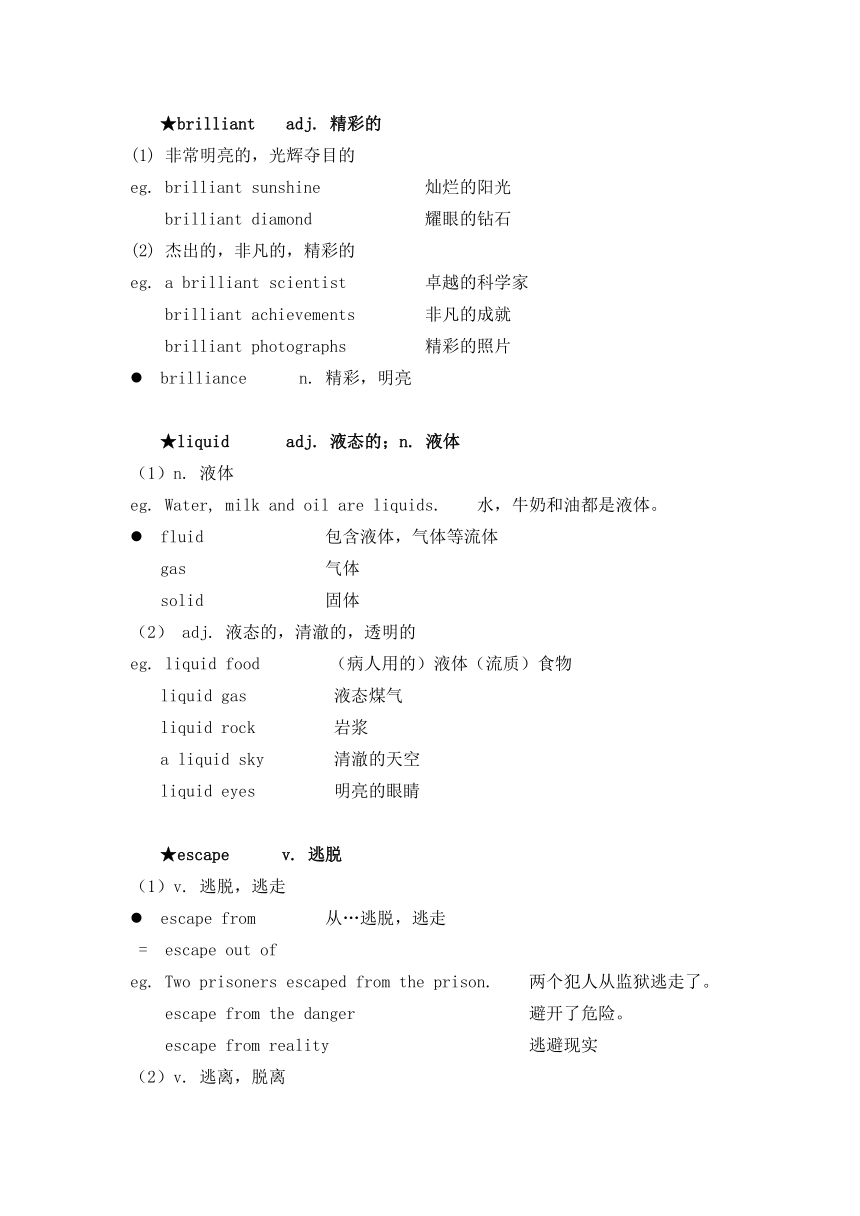
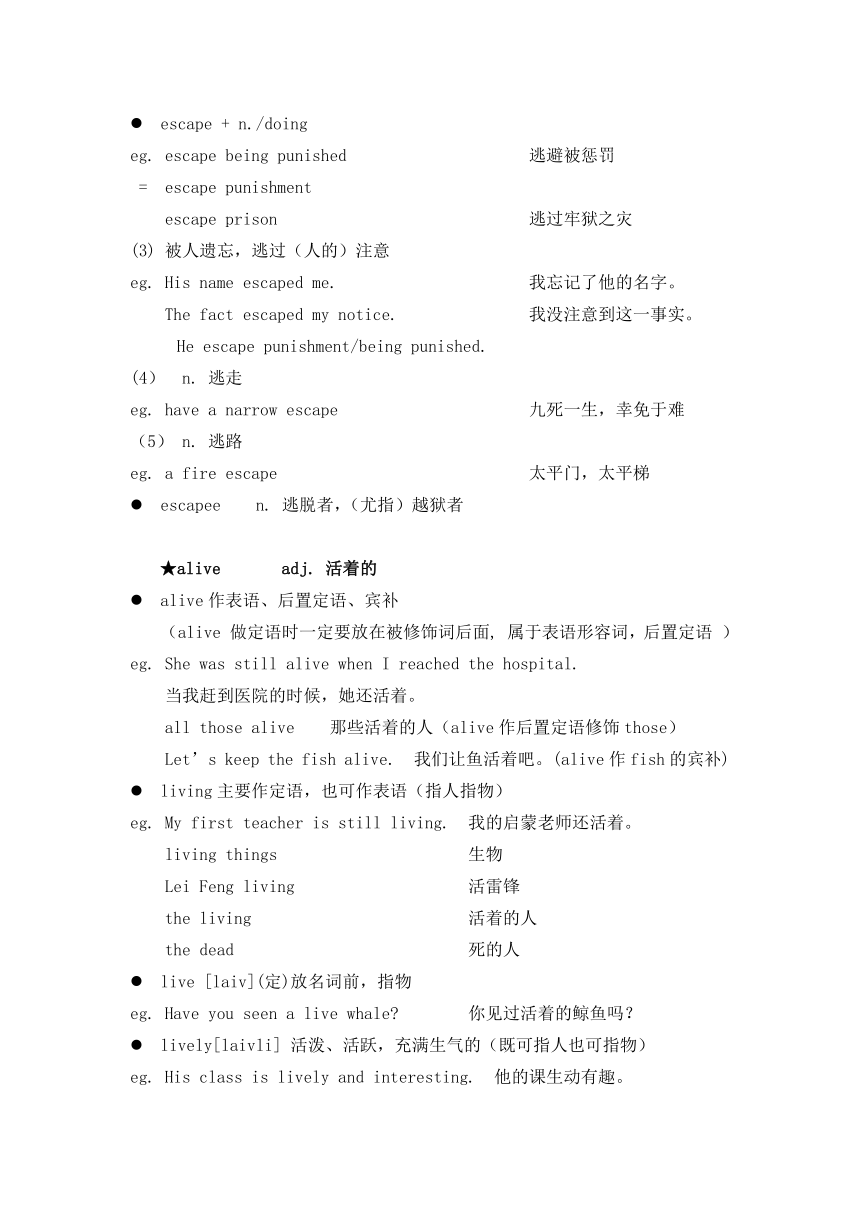
文档简介
Lesson 67 Volcanoes 火山
【New words and expressions】(12)
volcano n. 火山
active adj. 活动的
Kivu n. 基伍湖
Congo n. 刚果
Kituro n. 基图罗
erupt v. (火山)喷发
violently adv. 猛烈地,剧烈地
manage v. 设法
brilliant adj. 精彩的
liquid adj. 液态的;n. 液体
escape v. 逃脱
alive adj. 活着的
★volcano n. 火山
(复数: volcanoes)
eg. an active volcano 活火山
a dormant volcano 休眠火山
an extinct volcano 死活山
disaster n.灾害
eg. a natural disaster 自然灾害
earthquake 地震
flood 洪水
typhoon 台风
hurricane 飓风
storm 风暴
tornado 龙卷风
★active adj. 活动的
(1) adj. 活跃的,活泼的 (反义词:inactive 不活跃的)
eg. an active child 一个活泼的孩子
an active writer 一个活跃的作家
have an active brain 头脑灵活
(2) adj. 积极的,主动的(反义词:passive 消极的)
eg. take an active part in… 积极参与
the most active member of the club 俱乐部里最积极的会员
(3) adj. 活动中的,有效的;(军队中)现役的
eg. an active volcano 活火山
on active service (军队中)服现役的
(4) adj. 主动的(语法)
eg. active voice 主动语态
passive voice 被动语态
actively adv. 积极地,主动地
activity n. 活动[c],活力[u]
outdoor activities 户外活动
club activities 社团活动
a street full of activity 充满生气的街道
activist n. 积极分子
★erupt v. (火山)喷发
(1) v. (火山)喷发
(2) v. (比喻)突然发生
eg. When I saw the size of the bill, I simply erupted.
当我看到巨额账单,简直火冒三丈。
eruption n. 火山爆发;(医学)出诊
★violently adv. 猛烈地, 剧烈地
eg. The volcano erupted violently. 火山猛烈地喷发。
It stormed violently last night. 昨晚狂风暴雨来袭。
violent adj.
暴力的,(人)暴戾的
eg. He was voiolent when he got drunk. 他在喝醉的时候非常暴戾。
meet a voiolent death 死于非命
violent criminals 暴力犯罪
带有强烈情感地,有强烈情感引起的
eg. violent language 激烈的言语
in a violent shock 万分震惊
He has a violent dislike of school. 他极度厌恶上学。
厉害的,极度的
eg. violent winds 强烈的风
violent storms 强烈风暴
violent earthquakes 强烈地震
violent toothache 剧烈地牙痛
violence n. 猛烈, 强烈, 暴力, 暴虐, 暴行, 强暴
eg. resort to violence 诉诸暴力
with violence 剧烈地
★manage v. 设法
(1) 管理,经营 = run = be in charge of = operate
eg. manage a company /hotel 经营一家公司/酒店
(2) 控制,驾驭,照管
eg. manage a child 照管一个小孩
manage a horse 驾驭一匹马
manage one’s money 理财
做成,应付
eg. I can manage it myself. 我自己能应付。
产生,达到;设法做成…
manage to do sth. = try to do sth. and succeed
设法成功地做成某事
management n. 管理,经营
manager n. 经理(manageress 女经理)
★brilliant adj. 精彩的
(1) 非常明亮的,光辉夺目的
eg. brilliant sunshine 灿烂的阳光
brilliant diamond 耀眼的钻石
(2) 杰出的,非凡的,精彩的
eg. a brilliant scientist 卓越的科学家
brilliant achievements 非凡的成就
brilliant photographs 精彩的照片
brilliance n. 精彩,明亮
★liquid adj. 液态的;n. 液体
(1)n. 液体
eg. Water, milk and oil are liquids. 水,牛奶和油都是液体。
fluid 包含液体,气体等流体
gas 气体
solid 固体
adj. 液态的,清澈的,透明的
eg. liquid food (病人用的)液体(流质)食物
liquid gas 液态煤气
liquid rock 岩浆
a liquid sky 清澈的天空
liquid eyes 明亮的眼睛
★escape v. 逃脱
(1)v. 逃脱,逃走
escape from 从…逃脱,逃走
= escape out of
eg. Two prisoners escaped from the prison. 两个犯人从监狱逃走了。
escape from the danger 避开了危险。
escape from reality 逃避现实
(2)v. 逃离,脱离
escape + n./doing
eg. escape being punished 逃避被惩罚
= escape punishment
escape prison 逃过牢狱之灾
(3) 被人遗忘,逃过(人的)注意
eg. His name escaped me. 我忘记了他的名字。
The fact escaped my notice. 我没注意到这一事实。
He escape punishment/being punished.
n. 逃走
eg. have a narrow escape 九死一生,幸免于难
(5) n. 逃路
eg. a fire escape 太平门,太平梯
escapee n. 逃脱者,(尤指)越狱者
★alive adj. 活着的
alive作表语、后置定语、宾补
(alive 做定语时一定要放在被修饰词后面, 属于表语形容词,后置定语 )
eg. She was still alive when I reached the hospital.
当我赶到医院的时候,她还活着。
all those alive 那些活着的人(alive作后置定语修饰those)
Let’s keep the fish alive. 我们让鱼活着吧。(alive作fish的宾补)
living主要作定语,也可作表语(指人指物)
eg. My first teacher is still living. 我的启蒙老师还活着。
living things 生物
Lei Feng living 活雷锋
the living 活着的人
the dead 死的人
live [laiv](定)放名词前,指物
eg. Have you seen a live whale 你见过活着的鲸鱼吗?
lively[laivli] 活泼、活跃,充满生气的(既可指人也可指物)
eg. His class is lively and interesting. 他的课生动有趣。
We all should have a lively mind. 我们都该有个活跃的头脑。
a- 表语形容词:(不能做前置定语)
alive 活着的
asleep 睡着了的
alike 相象的
ahead 前面的
awake 醒着的
alone 独自的
【Text】
Haroun Tazieff, the Polish scientist, has spent his lifetime studying active volcanoes and deep caves in all parts of the world. In 1948, he went to Lake Kivu in the Congo to observe a new volcano which he later named Kituro. Tazieff was able to set up his camp very close to the volcano while it was erupting violently. Though he managed to take a number of brilliant photographs, he could not stay near the volcano for very long. He noticed that a river of liquid rock was coming towards him. It threatened to surround him completely, but Tazieff managed to escape just in time. He waited until the volcano became quiet and he was able to return two days later. This time, he managed to climb into the mouth of Kituro so that he could take photographs and measure temperatures. Tazieff has often risked his life in this way. He has been able to tell us more about active volcanoes than any man alive.
参考译文
波兰科学家哈罗恩·塔捷耶夫花了毕生的精力来研究世界各地的活火山和深洞. 1948年他去了刚果的基伍湖, 对一座后来被他命名为基图罗的新火山进行观察. 当火山正在猛烈地喷发时, 塔捷耶夫有办法把帐篷搭在离它非常近的地方. 尽管他设法拍了一些十分精彩的照片, 但他却不能在火山附近停留太长的时间. 他发现有一股岩浆正向他流过来, 眼看就要将他团团围住, 但塔捷耶夫还是设法及时逃离了. 他等到火山平静下来, 两天以后又返回去. 这次他设法爬进了基图罗火山口, 以便能拍摄照片和测试温度. 塔捷耶夫经常冒这样的生命危险. 他能告诉我们的有关活火山的情况比任何在世的人都要多.
【课文讲解】
1、Haroun Tazieff, the Polish scientist, has spent his lifetime studying active volcanoes and deep caves in all parts of the world.
the Polish scientist (同位语)
Polish 波兰的 ;Poland 波兰 ; Pole 波兰人
spend some time (in) doing sth. 花多少时间干……
spend some time (in) somewhere 在某地花了多少时间
spend… on sth./for sth. 在某事上花时间/金钱/精力
lifetime n. 一生,有生之年
in all parts of the world 世界各地的
eg. this world 今世
that world 黄泉
every country of the world 世界各国
a man of the world 世故的人
the world of art 艺术界
the plant world 植物界
2、In 1948, he went to Lake Kivu in the Congo to observe a new volcano which he later named Kituro.
to observe 动词不定式作目的状语
which he later named Kituro后来他命名的基图罗
which 引导定语从句修饰volcano
3、Tazieff was able to set up his camp very close to the volcano while it was erupting violently.
was able to = managed to do sth. 做成某事
set up his camp = put up his camp 搭起帐篷
close to 离……很近,与……靠近
4、Though he managed to take a number of brilliant photographs, he could not stay near the volcano for very long.
managed to do sth. 设法做成某事
a number of + 复数名词 许多,大量
= a great many + 复数名词
= a good many + 复数名词
= many a + (single)
5、He noticed that a river of liquid rock was coming towards him.
notice that + 宾语从句
notice sth.
notice sb. do/doing sth. 注意到某人做某事/正在做某事
a river of liquid rock 一股岩浆
(指岩浆比喻成河,是暗喻的修辞方法)
a river of… ……形成的河流
eg. a river of soil and stone 泥石流
6、It threatened to surround him completely, but Tazieff managed to escape just in time.
…threaten to… 迫近,预示坏事或危险
eg. The clouds threaten to rain. 乌云预示着要下雨。
He threatened to leave the team. 他扬言要离开这个队。
surround v. 包围
eg. surround sth.
The wall surrounds the jail. 高墙围绕着监狱。
be surrounded with sth./by sth.
The jail is surrounded with walls.
= The jail is surrounded by walls.
just in time 及时,刚好
just
adv. 恰好,正当(=exactly)
eg. just then/ just at that time 正好在那个时候
Just look! 看一看(用祈使句以缓和语气。)
Just a moment, please! 就等一下。
adv. 仅仅,只是(=only)
eg. I was just a child then. 那时我只是个孩子。
I’ve come here just to see you. 我来这儿只是看你。
7、He waited until the volcano became quiet and he was able to return two days later.
become quiet 变得平静
was able to 做成某事
8、This time, he managed to climb into the mouth of Kituro so that he could take photographs and measure temperatures.
manage to do sth. 设法做到某事,努力完成某事
(虽然很费劲,但仍然做到/完成某事)
try to do sth. 设法做某事,努力做某事(但并不一定成功)
climb into 爬进
climb out of 爬出
climb a hill 爬山
climb up 爬上
climb up the tree 爬上一棵树
climb down 爬下
the mouth of Kituro 火山口
the mouth of a tunnel 隧道口
the mouth of a bottle 瓶口
from mouth to mouth 人传人地
have a big mouth 嘴不严,说话无顾忌
keep one’s mouth shut 守口如瓶
so that 以便于(目的状语从句),一定含有情态动词
take photographs 拍摄照片
measure temperatures 测量温度
measure a piece of land 测量一块地
measure the speed of a car 测量汽车速度
measure one’s length 身体伸直趴倒在地上
temperature 温度,气温
eg. at a low temperature 低温
take one’s temperature 测量体温
have a temperature 发烧
= run a temperature
9、Tazieff has often risked his life in this way.
risk one’s life 冒生命危险
eg. take a risk of… = at a risk of… 冒着……的危险
risk sth.= risk losing sth. 冒着失去……的危险
risk doing sth. 冒着做……的危险
risk
(1)v. 冒险
risk + n. 以…作为赌注
risk doing sth. 冒险做某事
eg. He risked all his fortune for the new enterprise.
他把全面资产作为赌注投在这个新公司上。
I’ll risk being punished. 冒险被惩罚。
= I’ll risk be the punishment.
(2)n. 危险
eg. at any risk 无论冒什么险
run a risk = take a risk 冒险
reduce the risk of … 减少…的危险
incur risks 招致危险
10、He has been able to tell us more about active volcanoes than any man alive.
tell sb. sth. 告诉某人某事
tell a story 讲故事
tell the time 报时
tell the truth 说真话
tell a lie 说谎
tell a secret 告诉个秘密
tell the difference 辩认区别
than many man alive 比任何活着的人
(在两相比较中, 如果前者属于后者, 那一定要在比较时用other, else排除前者)
【Key structures】
Can, Be able to and Manage to
managed to do/ was able to 表示一个动作成功地完成了。
can与be able to 意思差不多,但can 只有现在时和过去时,而且could不能表明一个动作已经成功完成。
表示能力时用can/could,在将来时中表示“能力”时通常用will be able to,在表示成功地完成过去某个动作时用was able to而不用could。
He thought he could pass the exam easily, but he failed.
I can’t remember where I’ve seen him.
Jane can’t swim yet. She’ll be able to swim in a few months’ time.
manage to在表示成功地完成过去某个动作时,经常代替be able to,它更强调“虽然困难很大,但仍然……”。在否定句中,manage to与be able to经常可以互换。
He was able to finish the job yesterday. (表示可能)
He managed to finish the job yesterday. (暗示他克服了不少困难才完成)
【Special Difficulties】
带 say与tell的短语
1、say
在表示“说,讲”时,say后面不跟间接宾语(人)。如果一定要指明,则用“to +名词/代词”。表示“道别,诵读(祈祷),背诵”等含义时用say而不能用tell。say有“表达(思想、意见等)”、“据说”含义,tell则没有。
John is said to be very interested in art.
Do you have anything to say about the accident
关于这次事故你有什么想说的/想法?
He knelt down and said his prayers. 他跪了下来作祷告.
He said goodbye and left. 他告辞后离开了.
say a good word for 为……说好话/辩护;推荐
Don’t expect that he’ll say a good word for you.
2、tell
在表示“说,讲”时,tell后面可以跟双宾语。tell经常用于表示“讲(实话,谎话,秘密等)”。tell可以表示“辨别,分辨”,say则不可以。在英国英语中,tell the time(美语为tell time)表示根据钟表等“说出时间,识钟”
Can you tell me anything about it 你能告诉我有关的任何事情吗
He is only five, but he can already tell the time.
tell (sb.) a lie 说谎(谎言有很多个,为可数名词)
He often tells lies. 他经常说谎.
tell (sb.) the truth 讲真话(真话只有一个,故要特指, 加the)
I want you to tell me the truth. 我要你讲真话.
tell (sb.) the difference between 区分, 区别
Can't you tell the difference between an Austin and a Morris
你能区分奥斯丁舞和莫利斯舞吗
say和tell后面跟so时含义不一样:
I told you so! 我告诉过你是这样的!(用于情况被证实之后)
Who says so 谁这么说的?
I say so. 我这么说的。
【New words and expressions】(12)
volcano n. 火山
active adj. 活动的
Kivu n. 基伍湖
Congo n. 刚果
Kituro n. 基图罗
erupt v. (火山)喷发
violently adv. 猛烈地,剧烈地
manage v. 设法
brilliant adj. 精彩的
liquid adj. 液态的;n. 液体
escape v. 逃脱
alive adj. 活着的
★volcano n. 火山
(复数: volcanoes)
eg. an active volcano 活火山
a dormant volcano 休眠火山
an extinct volcano 死活山
disaster n.灾害
eg. a natural disaster 自然灾害
earthquake 地震
flood 洪水
typhoon 台风
hurricane 飓风
storm 风暴
tornado 龙卷风
★active adj. 活动的
(1) adj. 活跃的,活泼的 (反义词:inactive 不活跃的)
eg. an active child 一个活泼的孩子
an active writer 一个活跃的作家
have an active brain 头脑灵活
(2) adj. 积极的,主动的(反义词:passive 消极的)
eg. take an active part in… 积极参与
the most active member of the club 俱乐部里最积极的会员
(3) adj. 活动中的,有效的;(军队中)现役的
eg. an active volcano 活火山
on active service (军队中)服现役的
(4) adj. 主动的(语法)
eg. active voice 主动语态
passive voice 被动语态
actively adv. 积极地,主动地
activity n. 活动[c],活力[u]
outdoor activities 户外活动
club activities 社团活动
a street full of activity 充满生气的街道
activist n. 积极分子
★erupt v. (火山)喷发
(1) v. (火山)喷发
(2) v. (比喻)突然发生
eg. When I saw the size of the bill, I simply erupted.
当我看到巨额账单,简直火冒三丈。
eruption n. 火山爆发;(医学)出诊
★violently adv. 猛烈地, 剧烈地
eg. The volcano erupted violently. 火山猛烈地喷发。
It stormed violently last night. 昨晚狂风暴雨来袭。
violent adj.
暴力的,(人)暴戾的
eg. He was voiolent when he got drunk. 他在喝醉的时候非常暴戾。
meet a voiolent death 死于非命
violent criminals 暴力犯罪
带有强烈情感地,有强烈情感引起的
eg. violent language 激烈的言语
in a violent shock 万分震惊
He has a violent dislike of school. 他极度厌恶上学。
厉害的,极度的
eg. violent winds 强烈的风
violent storms 强烈风暴
violent earthquakes 强烈地震
violent toothache 剧烈地牙痛
violence n. 猛烈, 强烈, 暴力, 暴虐, 暴行, 强暴
eg. resort to violence 诉诸暴力
with violence 剧烈地
★manage v. 设法
(1) 管理,经营 = run = be in charge of = operate
eg. manage a company /hotel 经营一家公司/酒店
(2) 控制,驾驭,照管
eg. manage a child 照管一个小孩
manage a horse 驾驭一匹马
manage one’s money 理财
做成,应付
eg. I can manage it myself. 我自己能应付。
产生,达到;设法做成…
manage to do sth. = try to do sth. and succeed
设法成功地做成某事
management n. 管理,经营
manager n. 经理(manageress 女经理)
★brilliant adj. 精彩的
(1) 非常明亮的,光辉夺目的
eg. brilliant sunshine 灿烂的阳光
brilliant diamond 耀眼的钻石
(2) 杰出的,非凡的,精彩的
eg. a brilliant scientist 卓越的科学家
brilliant achievements 非凡的成就
brilliant photographs 精彩的照片
brilliance n. 精彩,明亮
★liquid adj. 液态的;n. 液体
(1)n. 液体
eg. Water, milk and oil are liquids. 水,牛奶和油都是液体。
fluid 包含液体,气体等流体
gas 气体
solid 固体
adj. 液态的,清澈的,透明的
eg. liquid food (病人用的)液体(流质)食物
liquid gas 液态煤气
liquid rock 岩浆
a liquid sky 清澈的天空
liquid eyes 明亮的眼睛
★escape v. 逃脱
(1)v. 逃脱,逃走
escape from 从…逃脱,逃走
= escape out of
eg. Two prisoners escaped from the prison. 两个犯人从监狱逃走了。
escape from the danger 避开了危险。
escape from reality 逃避现实
(2)v. 逃离,脱离
escape + n./doing
eg. escape being punished 逃避被惩罚
= escape punishment
escape prison 逃过牢狱之灾
(3) 被人遗忘,逃过(人的)注意
eg. His name escaped me. 我忘记了他的名字。
The fact escaped my notice. 我没注意到这一事实。
He escape punishment/being punished.
n. 逃走
eg. have a narrow escape 九死一生,幸免于难
(5) n. 逃路
eg. a fire escape 太平门,太平梯
escapee n. 逃脱者,(尤指)越狱者
★alive adj. 活着的
alive作表语、后置定语、宾补
(alive 做定语时一定要放在被修饰词后面, 属于表语形容词,后置定语 )
eg. She was still alive when I reached the hospital.
当我赶到医院的时候,她还活着。
all those alive 那些活着的人(alive作后置定语修饰those)
Let’s keep the fish alive. 我们让鱼活着吧。(alive作fish的宾补)
living主要作定语,也可作表语(指人指物)
eg. My first teacher is still living. 我的启蒙老师还活着。
living things 生物
Lei Feng living 活雷锋
the living 活着的人
the dead 死的人
live [laiv](定)放名词前,指物
eg. Have you seen a live whale 你见过活着的鲸鱼吗?
lively[laivli] 活泼、活跃,充满生气的(既可指人也可指物)
eg. His class is lively and interesting. 他的课生动有趣。
We all should have a lively mind. 我们都该有个活跃的头脑。
a- 表语形容词:(不能做前置定语)
alive 活着的
asleep 睡着了的
alike 相象的
ahead 前面的
awake 醒着的
alone 独自的
【Text】
Haroun Tazieff, the Polish scientist, has spent his lifetime studying active volcanoes and deep caves in all parts of the world. In 1948, he went to Lake Kivu in the Congo to observe a new volcano which he later named Kituro. Tazieff was able to set up his camp very close to the volcano while it was erupting violently. Though he managed to take a number of brilliant photographs, he could not stay near the volcano for very long. He noticed that a river of liquid rock was coming towards him. It threatened to surround him completely, but Tazieff managed to escape just in time. He waited until the volcano became quiet and he was able to return two days later. This time, he managed to climb into the mouth of Kituro so that he could take photographs and measure temperatures. Tazieff has often risked his life in this way. He has been able to tell us more about active volcanoes than any man alive.
参考译文
波兰科学家哈罗恩·塔捷耶夫花了毕生的精力来研究世界各地的活火山和深洞. 1948年他去了刚果的基伍湖, 对一座后来被他命名为基图罗的新火山进行观察. 当火山正在猛烈地喷发时, 塔捷耶夫有办法把帐篷搭在离它非常近的地方. 尽管他设法拍了一些十分精彩的照片, 但他却不能在火山附近停留太长的时间. 他发现有一股岩浆正向他流过来, 眼看就要将他团团围住, 但塔捷耶夫还是设法及时逃离了. 他等到火山平静下来, 两天以后又返回去. 这次他设法爬进了基图罗火山口, 以便能拍摄照片和测试温度. 塔捷耶夫经常冒这样的生命危险. 他能告诉我们的有关活火山的情况比任何在世的人都要多.
【课文讲解】
1、Haroun Tazieff, the Polish scientist, has spent his lifetime studying active volcanoes and deep caves in all parts of the world.
the Polish scientist (同位语)
Polish 波兰的 ;Poland 波兰 ; Pole 波兰人
spend some time (in) doing sth. 花多少时间干……
spend some time (in) somewhere 在某地花了多少时间
spend… on sth./for sth. 在某事上花时间/金钱/精力
lifetime n. 一生,有生之年
in all parts of the world 世界各地的
eg. this world 今世
that world 黄泉
every country of the world 世界各国
a man of the world 世故的人
the world of art 艺术界
the plant world 植物界
2、In 1948, he went to Lake Kivu in the Congo to observe a new volcano which he later named Kituro.
to observe 动词不定式作目的状语
which he later named Kituro后来他命名的基图罗
which 引导定语从句修饰volcano
3、Tazieff was able to set up his camp very close to the volcano while it was erupting violently.
was able to = managed to do sth. 做成某事
set up his camp = put up his camp 搭起帐篷
close to 离……很近,与……靠近
4、Though he managed to take a number of brilliant photographs, he could not stay near the volcano for very long.
managed to do sth. 设法做成某事
a number of + 复数名词 许多,大量
= a great many + 复数名词
= a good many + 复数名词
= many a + (single)
5、He noticed that a river of liquid rock was coming towards him.
notice that + 宾语从句
notice sth.
notice sb. do/doing sth. 注意到某人做某事/正在做某事
a river of liquid rock 一股岩浆
(指岩浆比喻成河,是暗喻的修辞方法)
a river of… ……形成的河流
eg. a river of soil and stone 泥石流
6、It threatened to surround him completely, but Tazieff managed to escape just in time.
…threaten to… 迫近,预示坏事或危险
eg. The clouds threaten to rain. 乌云预示着要下雨。
He threatened to leave the team. 他扬言要离开这个队。
surround v. 包围
eg. surround sth.
The wall surrounds the jail. 高墙围绕着监狱。
be surrounded with sth./by sth.
The jail is surrounded with walls.
= The jail is surrounded by walls.
just in time 及时,刚好
just
adv. 恰好,正当(=exactly)
eg. just then/ just at that time 正好在那个时候
Just look! 看一看(用祈使句以缓和语气。)
Just a moment, please! 就等一下。
adv. 仅仅,只是(=only)
eg. I was just a child then. 那时我只是个孩子。
I’ve come here just to see you. 我来这儿只是看你。
7、He waited until the volcano became quiet and he was able to return two days later.
become quiet 变得平静
was able to 做成某事
8、This time, he managed to climb into the mouth of Kituro so that he could take photographs and measure temperatures.
manage to do sth. 设法做到某事,努力完成某事
(虽然很费劲,但仍然做到/完成某事)
try to do sth. 设法做某事,努力做某事(但并不一定成功)
climb into 爬进
climb out of 爬出
climb a hill 爬山
climb up 爬上
climb up the tree 爬上一棵树
climb down 爬下
the mouth of Kituro 火山口
the mouth of a tunnel 隧道口
the mouth of a bottle 瓶口
from mouth to mouth 人传人地
have a big mouth 嘴不严,说话无顾忌
keep one’s mouth shut 守口如瓶
so that 以便于(目的状语从句),一定含有情态动词
take photographs 拍摄照片
measure temperatures 测量温度
measure a piece of land 测量一块地
measure the speed of a car 测量汽车速度
measure one’s length 身体伸直趴倒在地上
temperature 温度,气温
eg. at a low temperature 低温
take one’s temperature 测量体温
have a temperature 发烧
= run a temperature
9、Tazieff has often risked his life in this way.
risk one’s life 冒生命危险
eg. take a risk of… = at a risk of… 冒着……的危险
risk sth.= risk losing sth. 冒着失去……的危险
risk doing sth. 冒着做……的危险
risk
(1)v. 冒险
risk + n. 以…作为赌注
risk doing sth. 冒险做某事
eg. He risked all his fortune for the new enterprise.
他把全面资产作为赌注投在这个新公司上。
I’ll risk being punished. 冒险被惩罚。
= I’ll risk be the punishment.
(2)n. 危险
eg. at any risk 无论冒什么险
run a risk = take a risk 冒险
reduce the risk of … 减少…的危险
incur risks 招致危险
10、He has been able to tell us more about active volcanoes than any man alive.
tell sb. sth. 告诉某人某事
tell a story 讲故事
tell the time 报时
tell the truth 说真话
tell a lie 说谎
tell a secret 告诉个秘密
tell the difference 辩认区别
than many man alive 比任何活着的人
(在两相比较中, 如果前者属于后者, 那一定要在比较时用other, else排除前者)
【Key structures】
Can, Be able to and Manage to
managed to do/ was able to 表示一个动作成功地完成了。
can与be able to 意思差不多,但can 只有现在时和过去时,而且could不能表明一个动作已经成功完成。
表示能力时用can/could,在将来时中表示“能力”时通常用will be able to,在表示成功地完成过去某个动作时用was able to而不用could。
He thought he could pass the exam easily, but he failed.
I can’t remember where I’ve seen him.
Jane can’t swim yet. She’ll be able to swim in a few months’ time.
manage to在表示成功地完成过去某个动作时,经常代替be able to,它更强调“虽然困难很大,但仍然……”。在否定句中,manage to与be able to经常可以互换。
He was able to finish the job yesterday. (表示可能)
He managed to finish the job yesterday. (暗示他克服了不少困难才完成)
【Special Difficulties】
带 say与tell的短语
1、say
在表示“说,讲”时,say后面不跟间接宾语(人)。如果一定要指明,则用“to +名词/代词”。表示“道别,诵读(祈祷),背诵”等含义时用say而不能用tell。say有“表达(思想、意见等)”、“据说”含义,tell则没有。
John is said to be very interested in art.
Do you have anything to say about the accident
关于这次事故你有什么想说的/想法?
He knelt down and said his prayers. 他跪了下来作祷告.
He said goodbye and left. 他告辞后离开了.
say a good word for 为……说好话/辩护;推荐
Don’t expect that he’ll say a good word for you.
2、tell
在表示“说,讲”时,tell后面可以跟双宾语。tell经常用于表示“讲(实话,谎话,秘密等)”。tell可以表示“辨别,分辨”,say则不可以。在英国英语中,tell the time(美语为tell time)表示根据钟表等“说出时间,识钟”
Can you tell me anything about it 你能告诉我有关的任何事情吗
He is only five, but he can already tell the time.
tell (sb.) a lie 说谎(谎言有很多个,为可数名词)
He often tells lies. 他经常说谎.
tell (sb.) the truth 讲真话(真话只有一个,故要特指, 加the)
I want you to tell me the truth. 我要你讲真话.
tell (sb.) the difference between 区分, 区别
Can't you tell the difference between an Austin and a Morris
你能区分奥斯丁舞和莫利斯舞吗
say和tell后面跟so时含义不一样:
I told you so! 我告诉过你是这样的!(用于情况被证实之后)
Who says so 谁这么说的?
I say so. 我这么说的。
同课章节目录
